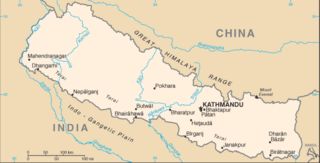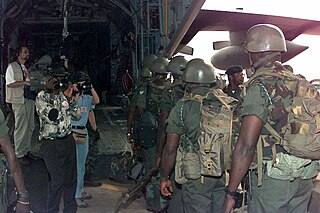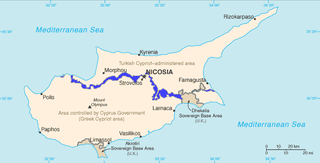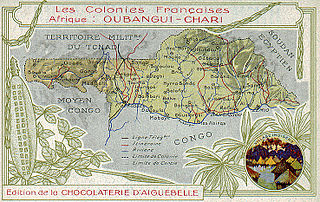
The United Nations Mission in Ethiopia and Eritrea (UNMEE) was established by the United Nations Security Council in July 2000 to monitor a ceasefire in the border war that began in 1998 between Ethiopia and Eritrea. First military troops Netherlands - Canadian battalion 'NECBAT' arrived and established bases in the region in December 2000.

The United Nations Mission in Nepal or UNMIN was a special political mission in Nepal, established by the UN Security Council in January 2007 through resolution 174040 (2007) to assist in implementing key aspects of the Comprehensive Peace Agreement that ended the internal armed conflict in the South Asian country. The mandate was subsequently extended in resolutions 1796 (2008), 1825 (2008), 1864 (2009), 1879 (2009) and 1909 (2010). UNMIN ceased its operations on January 15, 2011.

The United Nations Assistance Mission for Iraq (UNAMI) was formed on 14 August 2003 by United Nations Security Council (UNSC) Resolution 1500 at the request of the Iraqi government to support national development efforts.

United Nations Security Council Resolution 1864, adopted unanimously January 23, 2009, after recalling resolution 1740 (2007), 1796 (2008) and 1825 (2008) on the situation in Nepal, the Council extended the mandate of the United Nations Mission in Nepal (UNMIN), whose mandate expired that day, by another six months until July 23, 2009.
The Comprehensive Peace Accord was signed on 21 November 2006 between the Government of Nepal and the Communist Party of Nepal —at the time known as the Communist Party of Nepal (Maoist).

United Nations Security Council Resolution 1909, adopted unanimously on January 21, 2010, after recalling resolutions 1740 (2007), 1796 (2008), 1825 (2008), 1864 (2009) and 1879 (2008), the Council extended the mandate for the United Nations Mission in Nepal (UNMIN) until May 15, 2010 at the request of Nepal, deciding that it should also end on this date and further requiring UNMIN to hand over residual responsibilities including the monitoring of weapons and armed personnel.

United Nations Security Council resolution 1014, adopted unanimously on 15 September 1995, after recalling all resolutions on the situation in Liberia, particularly 1001 (1995), the council discussed various aspects of the civil war and extended the mandate of the United Nations Observer Mission in Liberia (UNOMIL) until 31 January 1996.

United Nations Security Council Resolution 1921, adopted unanimously on May 12, 2010, after recalling resolutions 1740 (2007), 1796 (2008), 1825 (2008), 1864 (2009), 1879 (2008) and 1909 (2009), the Council extended the mandate for the United Nations Mission in Nepal (UNMIN) until September 15, 2010 and stressed that arrangements should be made for the withdrawal of the mission by that date.

United Nations Security Council resolution 1195, adopted unanimously on 15 September 1998, after reaffirming Resolution 696 (1991) and all subsequent resolutions on Angola, the Council extended the mandate of the United Nations Observer Mission in Angola (MONUA) for a month until 15 October 1998.

United Nations Security Council Resolution 1933, adopted unanimously on June 30, 2010, after reaffirming resolutions 1893 (2009), 1911 (2010) and 1924 (2010) on the situation in Côte d'Ivoire and Resolution 1885 (2009) on the situation in Liberia, the Council extended the mandate of the United Nations Operation in Côte d'Ivoire (UNOCI) and supporting French forces until December 31, 2010, and expanded UNOCI's mandate with provisions to strengthen its capacity to consolidate stability in the country.
United Nations Security Council Resolution 1935, adopted unanimously on July 30, 2010, after reaffirming all previous resolutions and statements on the situation in Sudan, the Council extended the mandate of the African Union – United Nations Hybrid Operation in Darfur (UNAMID) for a further 12 months until July 31, 2011 and demanded an end to fighting and attacks on United Nations personnel and civilians.

United Nations Security Council Resolution 1941, adopted unanimously on September 29, 2010, after recalling all previous resolutions on the situation in Sierra Leone, particularly Resolution 1886 (2009), the Council extended the mandate of the United Nations Integrated Peacebuilding Office in Sierra Leone (UNIPSIL) until September 15, 2011.

United Nations Security Council Resolution 1953, adopted on December 14, 2010, after reaffirming all resolutions on the situation in Cyprus, particularly Resolution 1251 (1999), the Council extended the mandate of the United Nations Peacekeeping Force in Cyprus (UNFICYP) for a further six months until June 15, 2011, calling for Greek and Turkish Cypriot leaders to develop a plan for overcoming differences before the Secretary-General visit in January 2011.

United Nations Security Council Resolution 1964, adopted unanimously on December 22, 2010, after recalling previous resolutions on the situation in Somalia, the Council authorised the continuation of the mandate of the African Union Mission to Somalia (AMISOM) until September 30, 2011, and increased its size from 8,000 to 12,000 personnel.

United Nations Security Council Resolution 2003, adopted unanimously on July 29, 2011, after reaffirming all previous resolutions and statements on the situation in Sudan, the Council extended the mandate of the African Union – United Nations Hybrid Operation in Darfur (UNAMID) for a further 12 months until July 31, 2012.
United Nations Security Council Resolution 1740 was unanimously adopted on 23 January 2007, related to situation in Nepal, at the end of the Nepalese Civil War.
United Nations Security Council Resolution 1796 was unanimously adopted on 23 January 2008.
United Nations Security Council Resolution 1825 was unanimously adopted on 23 July 2008.
United Nations Security Council Resolution 1879 was unanimously adopted on 23 July 2009.

The Bangui Agreements are a 1997 negotiated peace accord in the Central African Republic (CAR). The accord was drawn up in Bangui to bring an end to the 1990s conflict between government and rebel forces. It was signed by the Patassé government, opposition parties and religious groups. The agreement envisaged several steps to sort out the views of various political factions, reorganize the defense establishment, and implement reforms in the country to improve its economy.












